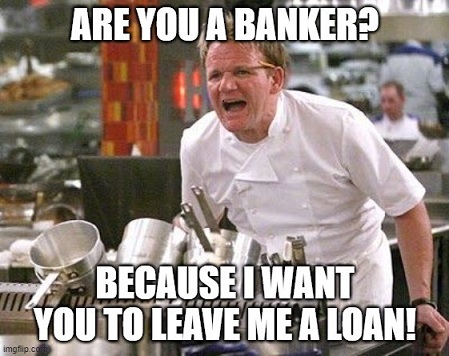
"Fitch"en Nightmares
If you were to make a list of the least exciting conversation starters, the health of the banking industry would be a top contender alongside the state of the weather and the world's greatest polka band. All the world wanted was a Mark Zuckerberg and Elon Musk cage match. Alas, we live in a world where Fitch Ratings dominate our headlines and create market turmoil.
Fitch Ratings (unrelated to Abercrombie, but just as unpopular) evaluates the creditworthiness and financial stability of various entities, including banks. Fitch looks at a bank's financial health, how it manages risks, and its position in the banking industry to determine a rating that indicates how safe or risky it might be for investors and stakeholders. Put another way, Fitch is Gordon Ramsay.
The expletive-laden Brit regularly casts fair, and often funny, judgement of different restaurants and cuisines throughout the world. Many look to Ramsay's recommendations, the same way investors look to Fitch. They're kind of a big deal.
Recently, Fitch Ratings raised a red flag, warning of potential downgrade concerns that could impact several major U.S. banks, including industry giants like JPMorgan Chase.
Earlier in June, Fitch reduced its assessment of the health of the banking sector, but this went relatively unnoticed as it didn't trigger actual downgrades. However, it was enough to stop this year's market rally, again proving that we can't have nice things.
If the industry's score were to be further downgraded, Fitch would have to reassess the ratings of over 70 U.S. banks it covers.
Earlier this month, Moody’s (another ratings agency, think Jamie Oliver or Uncle Roger) downgraded 10 small and midsized banks and warned that cuts could come for other lenders, including larger institutions like Truist and U.S. Bank. Fitch subsequently downgraded the U.S. long-term credit rating because of political dysfunction and growing debt loads, a move that was blasted by JPMorgan CEO Jamie Dimon.
To be fair, the "steaks" are a bit higher with those being judged by Fitch, as rating changes carry a bit more weight than a well-placed Ramsay insult.
Another downgrade would create a problem where the industry's ratings end up lower than some of its top-tier lenders. JPMorgan and Bank of America would likely get knocked down a rating because individual banks can't have a higher rating than the overall banking industry they're in.
For example, BankUnited, based in Miami Lakes, Florida, already operates at the lower boundary of what investors consider investment grade (just as gas station hot dogs operate at the lower boundary of what people consider food). If BankUnited falls another notch, it would be perilously close to non-investment grade.

Rating changes matter, as the impact can influence investor perceptions, sentiment, borrowing costs, and the behavior of institutional investors. It's also fair to expect some short term market volatility. Understandably, no one is pulling out their tiny violin and saying "poor banks." But I think consumers are tired of higher borrowing costs (i.e. higher interest rates), which is a likely outcome of further downgrades.
A downgrade is not inevitable. Fitch's caution signals the possibility of a real risk, but there is room for hope. The positive takeaway is that Fitch is giving the market a heads-up, making investors more aware and potentially more prepared for any changes. The financial world is a dynamic space, and the resilience of investors and institutions is what keeps it moving forward, no matter the challenges.
In the meantime, you can expect banks to be thinking to themselves: "Fitch, please."
Thank you for your continued trust and confidence.
Tyler Martin, CFP®, CPWA®

